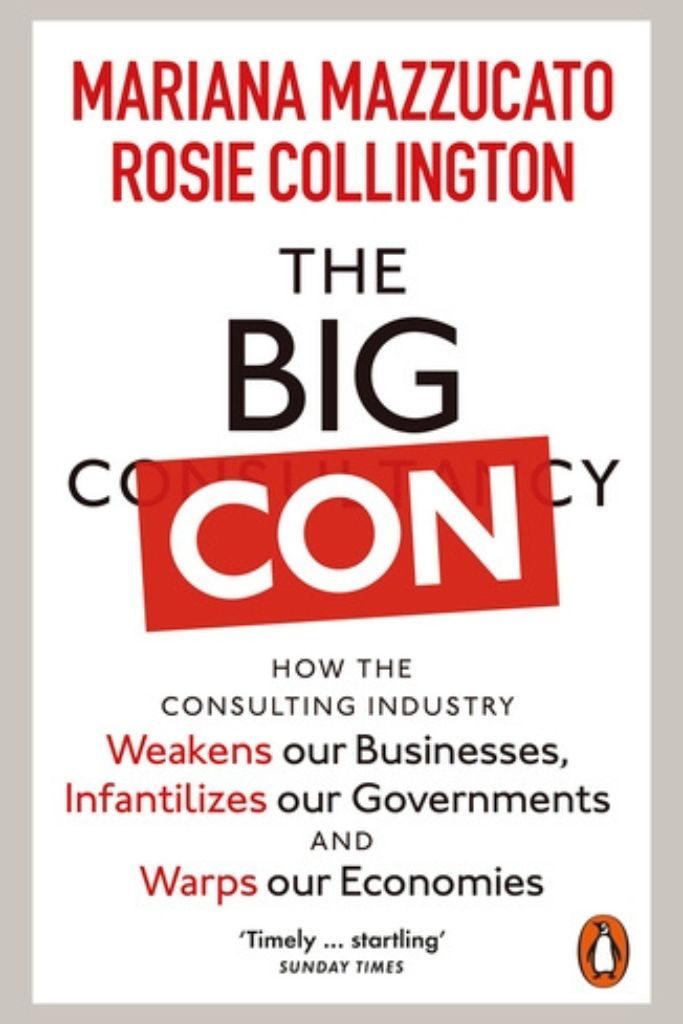In The Big Con, Mariana Mazzucato and Rosie Collington claim that our overreliance on the consulting industry has negative consequences for society, inhibiting knowledge transfer and corporate and political accountability. The authors expose how consultancies’ goal of “creating value” may not align with addressing major issues such as climate change, arguing convincingly for greater transparency and a revitalised public sector, writes Ivan Radanović.
 In their book The Big Con, Mariana Mazzucato and Rosie Collington warn that relying on consultancies harms the public interest. Asking what happens to the brain of an organisation when it is not learning by doing because someone else is doing the doing, they conclude that societies must return public purpose in centre of attention.
In their book The Big Con, Mariana Mazzucato and Rosie Collington warn that relying on consultancies harms the public interest. Asking what happens to the brain of an organisation when it is not learning by doing because someone else is doing the doing, they conclude that societies must return public purpose in centre of attention.
The authors’ thesis is that overreliance on consultancies harms public interest, disables governments, and threatens democracy.
In 2021, the consulting industry was valued at over 900 billion dollars. Its ninefold rise since 1999 is the result of rising reliance of states on consulting agencies. The authors’ thesis is that overreliance on consultancies harms public interest, disables governments, and threatens democracy. They investigate this trend and how to reverse it.
The “Big Con” is the term Mazzucato and Collington use to mark the biggest auditing, accounting, and consulting agencies such as Ernst & Young (EY), KPMG, PwC, Deloitte, McKinsey, Boston Consulting Group (BCG), Accenture and others. The consulting market emerged during early industrialisation, when engineers, periodically recruited by major industrial firms, formalised their work. In the 1920s many consultants, among them James McKinsey, cooperated with American businesses. The popularity of management consultancy rose in 1970 when BCG introduced the matrix for mapping the profitability of business portfolio. After two years, this tool was used (and paid for) by more than 100 enterprises. American firms, on the wings of the Marshall plan and later IT management projects, have spread throughout Europe.
Golden years
The election of the right-wing populists Margaret Thatcher in the UK (1979) and Ronald Reagan in the US (1981) occurred after a decade of economic turmoil, led by the end of the Bretton Woods system and two major oil crises. The opinion that the responsibility for the turmoil lay in how states were run mushroomed. The neoliberal credo was that the only value creators in society are markets, and with Thatcher and Reagan, favour was refocused from the worker to the citizen-taxpayer.
The neoliberal credo was that the only value creators in society are markets, and with Thatcher and Reagan, favour was refocused from the worker to the citizen-taxpayer.
Contrary to the belief that the essence of neoliberalism is to slash public spending, Mazzucato and Collington suggest “it is more precise to describe it as public spending redirection towards the stronger role of the market” (49). In Thatcher’s era (1979-1990) government expenditure rose in real terms by 7.7 percent (43). In Reagan’s (1981-1989) federal spending rose by almost nine percent annually (43). From the US to Australia, thousands of neoliberal reforms such as privatisation, deregulation or outsourcing states had to be implemented, and advised. The authors show us that the annual public spending for consulting in the UK from 1979 to 1990 rose fortyfold – from 7.1 million to 290 million dollars. The 1980s saw the advent of a new management doctrine. In place of earlier stable forms of organisational life emerged the model of flexible “learning organisations” which view instability as an opportunity. The main goal becomes maximising value for shareholders. In the 1990s, that led to the popularisation of storytelling in politics and business. It is no longer a product or brand that is sold, but the story about value, challenges and business success through positive change, peddled by elite consultants or management gurus.
Creating the impression of value
Today, consultants are seen as experts who transfer know-how and utilise advanced management techniques to improve clients’ businesses. The enormous rise of consulting in the last four decades is explained by the “value” they create for states and companies. However, according to the authors, consultants do not always meet expectations and they seldom transfer knowledge. Created “value” is often unclear and depends on the perception of the client. Consultants hustle to create the impression of value.
Created “value” is often unclear and depends on the perception of the client. Consultants hustle to create the impression of value.
There are many examples where engaging consultancies has backfired for states. In developing countries such as Nigeria, Mexico and Angola, hiring consultancies was a condition of their IMF loan agreements (50). The authors focus on wealthy countries, arguing that even if contracting consultants experienced in the implementation of complex macroeconomic programmes could be justified in developing countries, it is less justifiable in developed countries, which should ostensibly have high competency in these areas.
Unmet deadlines, spiralling costs
Consultancies often fail to deliver on their promises. In 2010, Sweden started the construction project for a new university hospital in Stockholm which would be the most advanced in Europe. Its operations were to be grounded in “value-based healthcare”, a concept designed by management guru Michael Porter. Costs were initially valued at 1.4 billion euro, with the project set to be completed in 2015. City authorities opted for a public-private partnership which contracted consultants from PwC and EY who claimed they would ”maximise the value and keep the costs under control” (145). Representatives from the construction company Skanska stated that this model would “transfer the risk from the state and taxpayers to the private sector” (145). However, the costs immediately surpassed the projections because vital equipment had not been included in the budget The project, beset by problems, was passed to BCG, who had nine consultants working on its implementation while earning a monthly salary of almost 70,000 euros over six years. Another consultancy, Nordic Interim AB was then contracted for an additional 12 million euro, and when the hospital was eventually finished in 2018, costs a billion euros higher than the original estimate.
Absence of accountability
It is not all about money. Consultancies contribute to many undemocratic practices, maintaining what Acemoglu and Robinson named as extractive institutions. Often, they act as a mechanism for public wealth extraction, whereby states recruit consultants when they want to “hedge” the political risk of unpopular economic measures. The states maintain legitimacy, and consultants get their share of political influence. Authors emphasise the example of Puerto Rico, which faced bankruptcy in 2016. Then-President Obama initiated the creation of an Oversight Board to supervise the bankruptcy process. Keeping reputational risk low, Washington ensured that the majority of members of the Board were of Puerto Rican heritage. The Board did not hire a large staff, to avoid looking like it was setting up a parallel government. Instead, it brought in consultants. Instead of the state, McKinsey engaged in the privatisation of public enterprises, healthcare reforms “based on value”, slashing public spending and restructuring debt. Moreover, McKinsey owned $20 million of Puerto Rico’s bonds: consultants were set to profit from the very same debt they were helping to restructure.
Regaining control
Even though consultancies did not cause the maladies of neoliberal capitalism, they have profited from them. Without transparency and democratic permission, they erode the capabilities of states and enterprises. Because knowledge is not cultivated within state workforces and institutions, a dependency on the “expertise” of consultancies spirals.
[Consultancies] erode the capabilities of states and enterprises. Because knowledge is not cultivated within state workforces and institutions, a dependency on the “expertise” of consultancies spirals.
The last section of the book is about “climate consulting”. Omnipresent and long-term, climate change is ideal ground for consultants. Competition is fierce; consultancies’ “websites are replete with beautifully designed free reports on sustainability issues for every sector, from oil and gas to healthcare” (190). They promise solutions, pitching themselves as an avant-garde of change.
The key takeaway, according to Mazzucato and Collington, is that we must challenge the predominance of consultancies. With their ultimate goal of “creating value”, they advise both the fossil polluters and the governments mandated to reduce emissions. Moreover, states are catalysts of technological change for public good, while the private sector only invests in fundamental research when it becomes enticingly profitable.
Putting aside the authors’ techno-optimistic view – which holds that climate change mitigation is mostly a technical issue regarding innovations for green transition, which is being debunked – their final suggestions are valid. A new narrative and vision for the role of the state, recovering public capacities, embedding knowledge transfer into consulting contracts’ evaluation and mandating transparency are, undoubtedly, desirable. The book’s importance lies in how it reveals the political implications of the consulting industry. Whether we choose “green growth” or abandon the growth imperative, one thing is certain: democratically elected governments are key actors. Only they can mobilise the resources required for achieving “moonshot” missions, the most urgent of which is climate change.
Note: This interview gives the views of the author, and not the position of the LSE Review of Books blog, or of the London School of Economics and Political Science.
Image credit: Alena Veasey on Shutterstock.








1 Comments